Effortless online growth
Streamline with Automatic Evergreen.
Embrace the power of automation with Automatic Evergreen. Perfect your sales funnels, automate your marketing, and keep your business thriving around the clock.
Episode #
[00:00:00] Matt Ragland: What if I told you there’s only one way to get comfortable on video, but it’s way easier than you think. Today’s episode is with Cam Houser. He’s a video creator, founder, teacher, and entrepreneur who helps people look great and feel comfortable on camera. In this lesson, Cam shared with us the reasons why people feel so uncomfortable on video, and he has a fun, unique, low pressure challenge to help you record more and get those reps in as a video creator.
There’s lots of ways that creators overthink their content. And video is one of the most common because literally everything is on display. This episode will help you build confidence and get more comfortable. If you can do this one little thing. All right, let’s get into it.
[00:00:42] Cam Houser: There are three phases. of being on camera. The first phase is horrifying. That’s when we see ourselves on camera and we are just like, oh my gosh, why does my family still love me? Like, oh my god, that, that’s terrible. But trust me, it’s not always that bad. The next phase is, well, I don’t love what I see.
But, you know, I’ll deal with it. This is the abiding phase. But the third phase is you see yourself on camera and you think, Man, I’m killing it. I’m telling a really good story. I’m doing a good job. I seem calm, collected. The best way to do it is just to be on camera. And, uh, before I even dive into that, one thing I want to offer is people ask, Well, Cam, the thing that really freaks me out when I’m on camera is I just don’t know what to say.
Should I memorize everything? Should I get a teleprompter and a big script? Short answer, don’t worry about it. Do this. Get a post it note, write your main points on it, tape it next to the camera. What that does is it gives you a skeleton of some structure to work with, but it means that you still sound natural.
If you memorize your text, What you’re going to say and you say it verbatim, it can be a little stilted, a little stiff, a little bit unnatural. If you just completely wing it and you’re freestyling, we’ll be a little bit disjointed in what we say. So yeah, a post it note with the key points. That’s what I recommend.
If you’re just starting out in terms of how to think of this stuff, the answer to everything is to make more videos. How do you become a better editor and make more videos? How do you get more calm and collected on camera? Just make more videos. Every second that you spend in front of the lens, talking, talking, is one more step towards you getting better with this stuff.
So at the end of the day, that should be your watch word, how you think about this, making more videos. Okay. I do want to allay some fears real quick. What happens when we post our first video to the internet? It’s the sound of crickets. It’s the tumbleweed rolling by the road. It’s shouting into the void.
It’s no one caring. That is what it is like. And that’s a good thing, okay? When we post our first video, and nobody cares, it lets you know that the world’s not watching you, which is nice. This is a gift, okay? So, I just share that to remind you that that’s what happens when you post your first video. You don’t need to be worried about horrible things happening.
So, you all probably know Marques Brownlee, um, you know, just king of the internet. Dashingly handsome. His first video is still on the internet and it’s him being an idiot. He is backlit. He forgot to take his glasses off all these things. So don’t worry if your initial videos aren’t good. Okay. It’s just not a problem.
The other thing is that a lot of us feel imposter syndrome. We feel, are we even allowed to be doing this? What do we have to say? You have lived a life. You have real experience. The world can benefit from what you share. Ultimately, at the end of the day, you sharing your story. can help someone else along the journey.
Okay. Something that is important that I do want to share is a phenomenon called the spotlight effect. And the spotlight effect is, it’s a research backed phenomenon that refers to when we see ourselves on camera, we think, Oh, that’s terrible. You will notice that there might be a hair out of place. You might notice that your clothes have a fold in them.
The spotlight effect is when we. Over index on those problems that they’re not what other people notice. We notice them more because it’s us. So don’t worry when you see your flaws on camera, just note that not everyone else is, you know, Going through it with a fine tooth comb, the same way you are. But I want to share right here is this is a list of camera confidence builders.
This is a list of ways to warm up and ways to approach feeling really normal on camera. Feel free to screenshot this. This is a list that I’ve cobbled together, working with thousands of people, helping them. Get better on camera. And you can feel free to borrow any of these that you want. Okay. I want to shift into some learning by doing, and what we’re going to do is this is the single most impactful, important thing that I have found to help people get used to making videos.
Okay. And it’s an exercise called a hello video. Here’s what it is. We’re going to record a quick video on your phone that you send to a friend, a colleague, could be a family member. But the point is that you’re going to just do it quick and dirty. Not a lot of production. We’re not going to worry about the camera, all that kind of stuff.
If you don’t feel comfortable sending it to anyone you know, my DMs are open on Twitter. I’ll share it again in a second. But this is something that I have done hundreds of times. Just recording super quick videos to share to people. Just to get used to turning the camera on, looking at the lens, delivering.
Learning how to speak and deliver well. Okay. What’s amazing about when you do this is that it makes people stay. So there’s something meaningful about this. Is it again? We can record stuff at home. That’s fine. But what’s important about this exercise is that we’re actually sending it to someone. And that’s because what a lot of y’all are going to do.
You’re going to record videos, and you’re not going to hit publish. Uh, Matt has done this, I’m sure he has, and I know you have too. That you have stuff in the chamber that we think is bad, it’s a very normal thing. There’s this moment of insecurity and paranoia that washes over us. I still get it, and I’ve published thousands of videos.
That is like, oh, this sucks, why does anyone want to listen to this? I’m not saying anything new or interesting, and That’s a bad voice. You don’t need that voice. It’s not helping. So this is one way to get over that by shipping it, by hitting send on this video to someone. It means that we’re doing the equivalent of publishing.
That’s why this is powerful. So rather than me just talking about this, guess what? We’re going to do this. I’m going to give you some time. Now, I’ve done this so many times that it turns out a lot of people really like to have a script for this. Because if you just send a video to a friend, it’s actually complicated for a lot of people.
So I’ve given you a script, but I don’t care what you say. You can say, Oh, I went by Chipotle the other day, and I remember we joking about avocado. It doesn’t matter. The content is unimportant. The value of this exercise. Is we’re just gonna record a quick video on our phones, just hit record, talk for 30 seconds, and send it.
If this is too weird for you, you can send it to me. My Twitter is right there, my DMs are open. Just saying, hey, what’s up? I’m in your workshop right now. The point is, is this is giving you a rep, some practice in the gym, okay?
[00:06:37] Matt Ragland: I love this. And don’t, like, like Cam was saying, I’m just repeating what Cam said.
But just being easy with it and like, Hey, this is just something that I’m saying to a friend. It’s really powerful. If you’re watching the replay of this, if you’re listening to it later, just hit pause, be willing to put ourselves out there because Cam’s right. The more that you do this, the more, the more comfortable you’ll get.
[00:06:58] Cam Houser: Matt’s being Matt. Matt’s being too nice. The gift that we are giving you here is that instead of you just internalizing content, ingesting content, which is what we all do, what we need to do is actually take action. So that’s the gift we are giving you here. This timer is going to count down. Send a video to someone, anyone.
Hey, I was thinking of you. Hope you’re well. Talk to you soon. Now we just give you this time left the time. All
right, gang. Now we can breathe a sigh of relief. We gave it a shot. We don’t need to make. Pulp Fiction. We don’t need to make the greatest video that’s ever been recorded. The point is just to get a little bit of practice. That’s it. Hope you did it. Well done. If anyone wants to share how that went, feel free.
If anyone wants to say, Cam, I hate you. You’re a bad man. Why are you forcing me to do this? I can handle that too. That’s totally fine. If you want to berate me in the chat, good learning sometimes happens with a little bit of discomfort. And that is my gift to you is the discomfort to do it now when the stakes are low, as opposed to when it’s time to launch your product, your big new push.
I think it’s going to change the trajectory of your life as a creator. I want you to iron the kinks out now. I want you to have this discomfort. Now you’re in the gym. Lifting weights, doing it badly, bad form. It’s embarrassing. Oh, you don’t have any muscles. Everything’s terrible. We want to do it when it doesn’t count so that when we’re on stage and the world is looking at us.
So that’s what this exercise is about. Do this and you will get better.
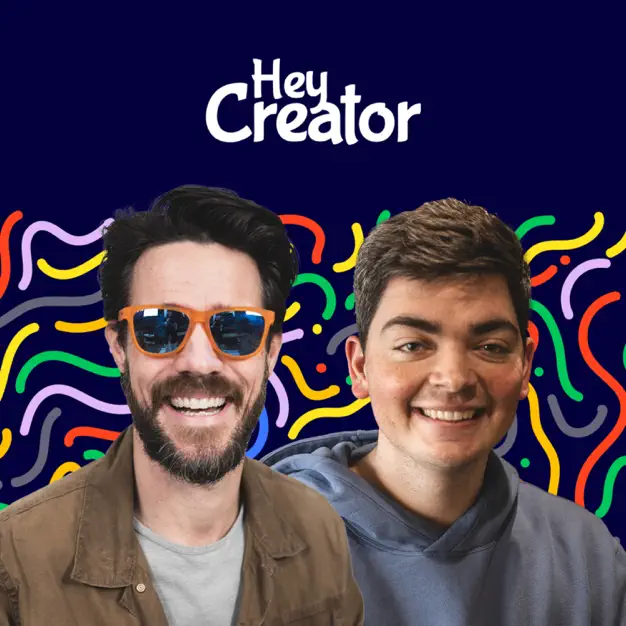
HeyCreator is the show for building your creator business. Each week, hosts Matt Ragland and Tim Forkin talk through all stages of the creator journey, intentionally designing each conversation to meet you where you’re at along the way. We’re sharing lessons from over a decade of helping digital creators launch and scale courses, communities, and coaching services — along with building newsletters, YouTube channels, and podcasts to millions of subscribers and downloads for our clients.

Cam Houser is a 4x founder and entrepreneur coach who helps leaders at large companies, institutions and governments become excellent on-camera. Cam runs a cohort course for many of his clients called Minimum Viable Video, where he breaks down the basics of video presence and production.
Effortless online growth
Embrace the power of automation with Automatic Evergreen. Perfect your sales funnels, automate your marketing, and keep your business thriving around the clock.

General Manager, Operations
Meet Katie, our GM working with efficiency and heart behind the scenes at HeyCreator! Katie acts as the driving force that ensures our business operations run smoothly day in and out. Outside of work, she’s a dedicated mom and wife, and when she isn’t navigating the world of raising good humans, you can find her tending to her garden, shopping local, planning her next family trip, or lost in a good book.
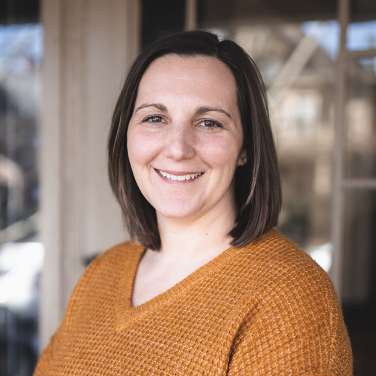
Content Producer
Tim runs HeyCreator content and all video-related projects for our clients. As a creator himself, he focuses on helping others love the process of content creation — working with a strong belief that creating should be simple, joyful, and fun.

Director, Newsletter
KC loves to take things apart to see how they work and try to build something better. He may not have all the answers, but he knows where to find them. When KC’s not at the gym or collecting LEGO, he’s usually driving his 4 kids around or at ballroom dance classes with his wife.

Senior Solutions Expert
As a solutions architect, Eli makes sure our clients are maximizing their platforms by always providing the right solution. More importantly, he is an advocate for social progress, amplifying marginalized voices, and destigmatizing mental health. Also a loving cat dad.
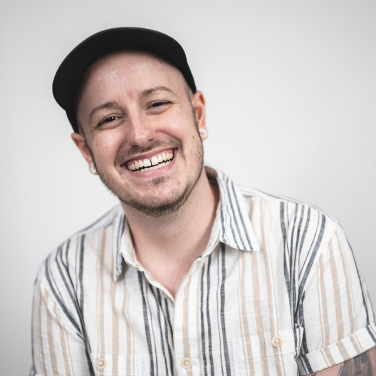
Web Developer
Nico is a passionate web developer skilled in WordPress, HTML, CSS, and JavaScript, with a keen interest in GitHub. She loves traveling, makeup, hiking, and spending time with her family and young daughter. Nico aims to be a positive role model by balancing her professional ambitions and personal passions.

Integrations + Research Expert
Andrew is a tech wizard in the UK that started in engineering and science, then working with game engines and simulations and ended up with a calling to be a creator and help other creators. He spent several years in Colombia and returned to the UK with a wife, son and serious coffee addiction. In his spare time he works on his own creative endeavours (maybe one day making his own apps and games too) between rewatching all Marvel movies, reading and time with family.

Matt Ragland focuses on the intersection of productivity and the creator economy. He is here to serve people creating content and products to improve the lives of their biggest fans. Matt was the 5th employee at ConvertKit, ran Creator Success at Podia, and has built an audience of over 100,000 fans across his newsletter, YouTube channel, and social media channels.
Creator content has exploded in the past few years, but he believes there’s so much more to come and that millions of potential creators still have a story to tell, great work to produce, and people to serve. That includes you!
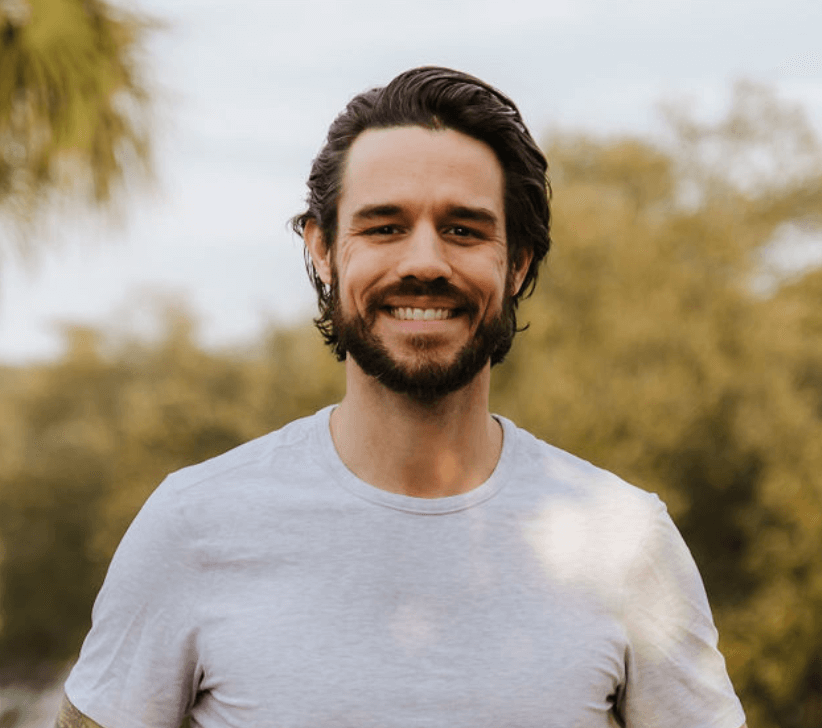
Designer
Tom is a graphic designer specializing in UI and Branding, blending aesthetics with functionality to create inspiring user experiences. Outside of his creative work, he is an avid cyclist and sauna enthusiast, finding balance and energy for further professional development.

Director, Growth
Outside of finding an excuse to talk about CrossFit, you can find Terry helping our clients discover and implement scalable revenue generating systems. He’s also a contributor at Entrepreneur magazine, podcast host, keynote speaker and father of four. Please pardon all the dad jokes in advance.

Technology Specialist
Ariadna is a web enthusiast with a love for nature. Builds websites by day, embraces the mountains and rivers by night.

Associate Manager, Marketing
Hannah has a passion for digital marketing but is dedicated to the project manager life due to her obsessions with list-making and people-pleasing. Chat her up about anything related to piano, traveling, cooking, or fitness and she is all ears. Last, but certainly not least, Hannah prides herself in winning ‘favorite aunt’ to her nephews, 7 years and counting.

Development Lead
Ciprian guides a talented team of devs to create top-notch products. Having kick-started several ventures, Ciprian brings vast experience to the table. Off duty, you’ll find him practicing yoga, salsa dancing, savoring Italian cuisine, or soaking in sea breezes.

Web Developer
Otilia is a WordPress developer with a passion for coding; she strives to stay ahead of trends by putting a focus on continuing education within her industry. She is also a dedicated mother to her two daughters and values her family immensely. In her spare time loves reading and creating. She also has a keen interest in perfume and fragrance!

Manager Director, Services
When not developing marketing strategies for our clients, Cory is a girl dad, backyard birding enthusiast, Wisconsin sports fan and still waiting for Darrell to meet him on the golf course.

Manager, Technology
Chloe strives to support our clients and team on a mutual path to success. When she isn’t tied to her inbox, you can find her curled up with a good book, hanging out with friends, or focused on leveling up her writing skills.

Digital Project Manager
Has been dreaming and building online & digitally since…forever, toward a better world. WordPress enthusiast & passionate about anything OpenSource. Her drive is people because there’s always strength in numbers. Also: Cats! But really, all animals.

Director, Content + Community
Content creator, salesman, and system driven productivity guy — Matt can see the big picture of the creator landscape and draw map for client success. If he’s not on Zoom or recording a YouTube video, Matt is usually in the woods somewhere with his wife and three sons.

Terry Rice is a high-performance coach to entrepreneurs, keynote speaker and staff writer at Entrepreneur magazine. He’s also the host of Reclaim + Advance, a podcast that helps entrepreneurs overcome setbacks and perform at their highest level.
Prior to becoming a creator-entrepreneur, Terry’s previous experience includes internal consulting roles at Adobe and Meta.
In addition to his role as Director of Growth and Partnerships at Good People Digital, Terry is an instructor at New York University, speaks at events for leading companies – including Amazon and Google – and has been featured as a subject matter expert by Good Morning America, Fast Company and the Wall Street Journal.
Based in Brooklyn, he is a husband, father of five children, and is an advocate for mental and physical fitness.
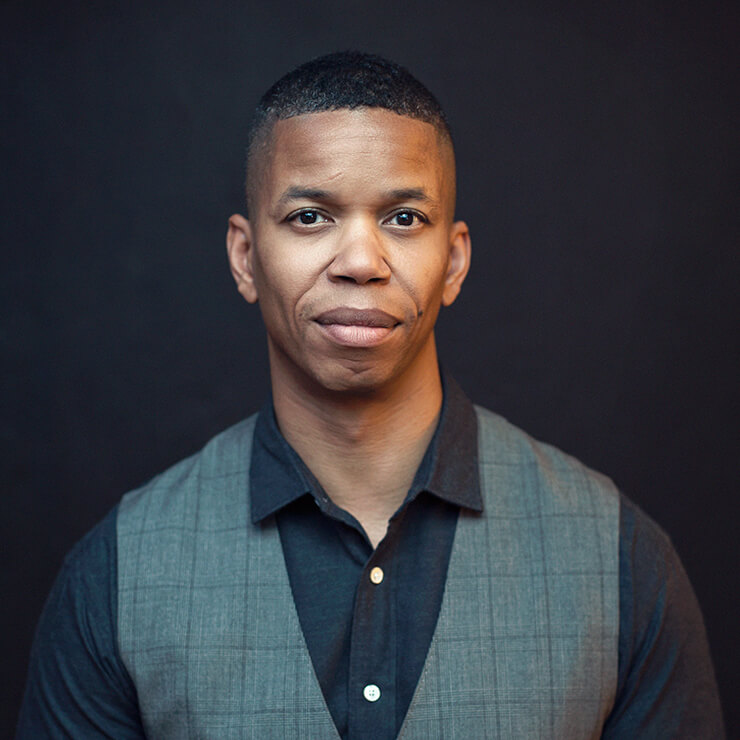
Founder, Chief Executive Officer
The chief, the boss, the showrunner of this company, Darrell has made the whole thing go since starting it on his laptop in a coffee shop seven years ago. Also, his golf handicap is garbage, but he’ll meet you out there anytime.

You can see how this popup was set up in our step-by-step guide: https://wppopupmaker.com/guides/auto-opening-announcement-popups/


